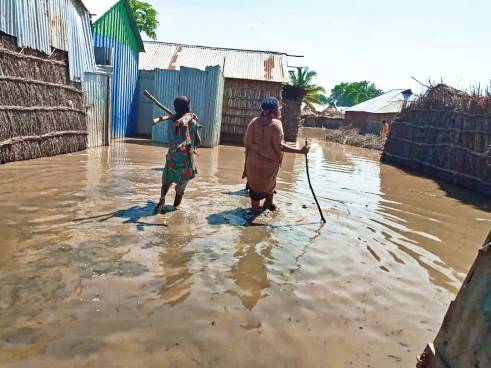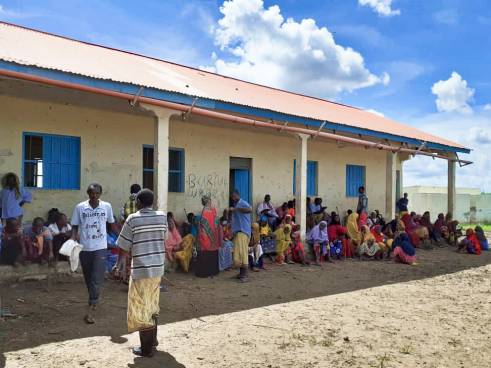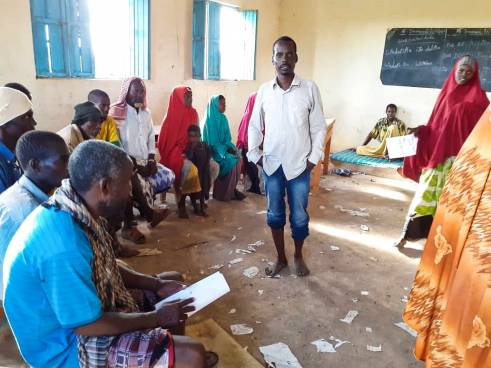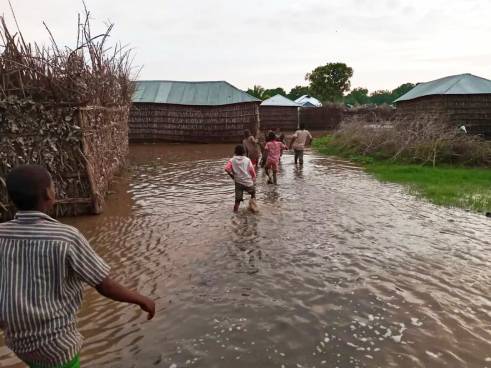
Flooding in East Africa has left hundreds of older people who should be protected from COVID-19 dangerously exposed to the virus in crowded, confined places or out in the open air after their homes were destroyed, HelpAge International said today.
Heavy rains have triggered devastating floods in recent weeks, in Ethiopia, Kenya, Rwanda, Somalia and Uganda, killing hundreds of people and forcing tens of thousands from their homes.
Older people have been forced to live in crowded schools, displaced people’s camps or out in the open, exposed to COVID-19 and other diseases, such as malaria and pneumonia. A partner in Kenya has also raised the alarm about older people living with HIV/AIDS who are unable to access vital life-saving anti-retrovirals after being displaced from their homes.
“Urgent support is needed for the older people who have been left stranded and exposed to the potentially fatal COVID-19,” said Carole Ageng’o HelpAge’s Africa director.
“Physical distancing and basic hygiene practices are being universally endorsed – particularly for older people who face the highest risk of serious illness or death if they contract COVID-19. But these cannot be done when people are forced to flee their homes and live in emergency conditions.
“While attention is focused on the very real danger of COVID-19, this is not an excuse to ignore broader humanitarian crises triggered by climate disasters. The floods create a very real risk of malaria, pneumonia and malnutrition, which can be just as deadly as the virus.”
People living with HIV/AIDS have no access to treatment in Siaya County, western Kenya
People living with HIV/AIDS have no access to vital life-saving anti-retrovirals following heavy floods in Siaya County in Western Kenya that led to the displacement of over 5,000 families.
The floods which began in April led to the River Nzoia bursting its banks engulfing people’s homes and fields.
Daniel Odipo of the Kenyan Society of People Living with HIV/AIDS (KESPA) says that older people living with HIV/AIDS can no longer access their anti-retroviral medicine and services that they need to keep themselves alive.
“People, whose immune system is already compromised, are now living in very precarious conditions in empty school classrooms, many of which have no doors or windows. They are exposed to the cold as well as mosquitoes, which leaves them exposed to malaria. They are also at risk of COVID-19 as they are living in crowded and cramped conditions, with no access to masks, gloves or hygiene facilities to protect them from the virus.
“It’s very concerning as the rains are continuing today; latrines have been submerged and there is very little food available.
“These floods happen every year and the authorities should have been better prepared to help those affected. People urgently need food and bedding. I know there is the added challenge of COVID-19, but even without that, people don’t get the support they need.
“There should be a comprehensive plan that includes supporting those who have been displaced to resume their normal life after the floods. Many have lost their homes and all their belongings. Older people in particular will need help as it is very dangerous for them in crowded displaced people’s camps where they are at risk of contracting COVID-19.”
Older people facing hunger and disease in Jowahar, Somalia

Older people are among those facing hunger and disease, following flooding and torrential rain in Somalia’s Jowahar district along the Shebelle River, which has destroyed people’s homes, businesses, livestock and crops.
The floods, which began a month ago and are continuing today, led to a massive displacement of people who had to leave their homes with nothing but the clothes on their backs. They are now living in the open air, with no access to food, clean water and toilets, health care or mosquito nets.
Abdikariim Ibrahim of Human Life Development Initiative, a partner of the global HelpAge network, said:
“This was particularly hard for older people as they were forced to walk through flood waters, fearing they may drown and then had to climb up to higher ground. Many of them have health conditions, such as heart disease, and this left them exhausted and very stressed. They are now living in crowded displaced people’s camps and are afraid of contracting COVID-19 and other diseases. Their immune systems are very low, because of exhaustion and lack of food.”
The Somali Water and Land Information Management (SWALIM) estimates that the floods in Middle Shebelle have damaged more than 10,000 hectares of cropland in Jowahar and Mahaday Weyne.
Abdikariim added:
“It’s difficult for them to guard against contracting COVID-19 as there are water shortages in the camps. Many are forced to use contaminated water and there are no facilities for handwashing.”
Human Life Development Initiative is currently working closely with the local authority to relocate older people to local schools and to identify those most at risk. Emergency teams have identified the most important needs of the older people including, shelter, food, mosquito nets, blankets, water treatment tabs, toilets and emergency medical services.
Older people crowded into schools following flooding in Entebbe, Uganda
Hundreds of people are crowded into empty schools or living out in the open following flooding in Entebbe, Uganda, which destroyed houses and crops. More flooding is expected this week with the continuing rains.

Several places in and around Entebbe were submerged by the rising water levels of Lake Victoria on Sunday. Hundreds of people lost their homes and crops, including the staple crops of maize and cassava, which people depend on for their diet.
Arthur Namara of Health Nest Uganda, a member of Global HelpAge Network in Entebbe, spoke to several older people who had been affected. He met one woman who was hiding from her seven orphaned grandchildren as she had nothing to give them, after all her crops had been destroyed. He said:
“It’s a terrible situation for the older people as they are now crowded into empty schools, completely flouting COVID-19 isolation guidelines, or they are living out in the open, exposed to the elements and other health hazards. And there are no humanitarian organisations who can help as they have been grounded due to the lockdown.
“I am concerned that the older people are at particular risk of contracting COVID-19 or other water-borne diseases as the toilets have been submerged and people are having to defecate out in the open. And this is only going to get worse as more and more people arrive in Entebbe. Rwamunyu, an island in Lake Victoria, was completely submerged by the lake and now its population of over 4,000 people are flocking to Entebbe.”
Thousands left homeless and vulnerable to disease in Kasese, eastern Uganda

Thousands of people are vulnerable to malaria and other diseases as they are living out in the open after several rivers burst their banks in Kasese in eastern Uganda.
Four rivers burst their banks and stones flooded down the mountains destroying bridges, primary schools, a hospital, homes and farmland. More than 170,000 people have been affected and over 24,000 homes have been damaged or destroyed.
Magret Masika, an older woman who fled her home after River Nyamwamba burst its banks is now living out in the open with her family. She explained how they have lost everything in the floods: “The flooding took our food crops, clothes, kitchen items and the children’s school books.”
Richard Asiimwe, an older pastoralist explained that 600 acres of farmlands had been destroyed by the floods, as well as a number of animals. He is now afraid that the animals that have survived will also die as they have nothing to eat or drink.
